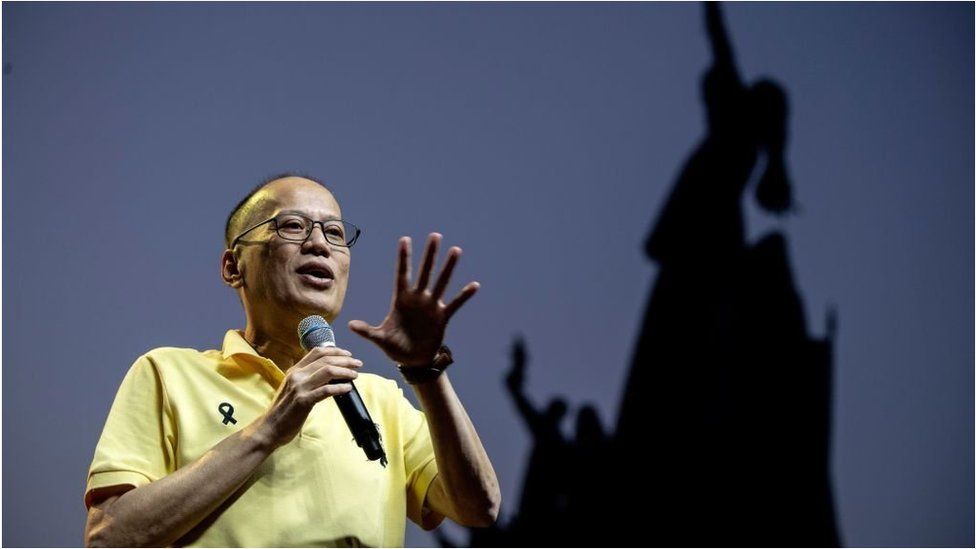Benigno Aquino III: The quiet son of Philippine democracy icons
- Published

Mr Aquino was seen as continuing his parents' legacy
Former Philippine president Benigno "Noynoy" Aquino III, scion of the country's revered Aquino family, has died at the age of 61.
While in power from 2010 to 2016, he famously took China to court over a long-running dispute involving the South China Sea, parts of which the Philippines claims as the West Philippine Sea.
Aquino had been largely silent and out of the public eye after his presidency ended.
On Thursday his sisters released a statement saying he had died peacefully in his sleep that morning due to kidney failure "secondary to diabetes".
Blue-blooded parentage
Aquino was the only son of his much-revered parents, the late Senator Benigno Aquino Jr and former president Corazon Aquino.
His nickname Noynoy was a tribute to his father's own moniker - Ninoy.
Ninoy Aquino's dramatic assassination in 1983 electrified the country. He had been in exile in the United States, forced to flee the martial law of Ferdinand and Imelda Marcos. Determined to bring democracy to his country he flew back to Manila - only to be killed upon landing.
Tens of thousands of people joined the outpouring of grief, fuelling a pro-democracy movement that President Marcos responded to by calling a snap election in February 1986.
Young Noynoy's mother, Corazon "Cory" Aquino, became the standard-bearer of her husband's legacy, and vowed to carry on her husband's work.
The late Cory Aquino, seen in a 2007 file photo with her son, also led the Philippines as president
The Marcoses claimed victory - sparking the first famous People Power revolution against them. The million people who gathered on the streets felt they were risking their lives to save democracy.
Cory Aquino eventually became president, going on to survive several coup attempts - one of which resulted in young Noynoy almost being killed in a shoot-out at the presidential Malacanang Palace in 1987.
One of the five bullets that hit him remained lodged in his neck for the rest of his life.
Political ascent
Growing up in the shadow of such admired parents, with four sisters - one of whom, Kris, is a prominent TV personality - Noynoy, himself a bachelor, was often known as the quiet Aquino.
He earned a degree in economics from the elite Ateneo university in Manila before joining his family when they were in exile in Boston.
Following his return to the Philippines in 1983, he worked in various businesses and was elected to Congress in 1988. In 2007 he won a seat in the Senate.
In 2009 his mother died of cancer and again, tens of thousands of Filipinos surged onto the streets to show their love for the Aquino family.
After a landslide victory in 2010, he took charge of a country struggling with widespread corruption, poverty and ageing infrastructure.
But he also played down the expectations heaped on him, warning that a president would have to be "Superman and Einstein combined" to solve the country's problems immediately.
Aquino had popular support early in his career
Months after taking office, Aquino suffered his first crisis, when a former policeman held a bus filled with Hong Kong tourists hostage in central Manila.
The incident was broadcast live around the world, and ended badly with the hijacker killing eight hostages before he was shot dead by police. Aquino's government was heavily criticised for its handling of the siege.
Aquino has been credited with pushing through key economic reforms and for his attempts to root out corruption, though critics have said he did not do enough to help the poor.
In December 2012, Aquino signed the controversial Reproductive Health Bill into law, which had languished for years in Congress before it was passed by lawmakers.
The law provided universal access to contraception, fertility control, sexual education and maternal care. Though it was met with fierce criticism in the Philippines, which has a majority Catholic population, experts said the law helped women and managed population growth.
With Aquino as the chief architect of Philippine foreign policy, the country filed its arbitration case against China over claims in the South China Sea in 2013.
In July 2016, the Permanent Court of Arbitration ruled in favour of the Philippines, invalidating China's territorial claims. Beijing rejected the verdict, but the move won Aquino popular support with Filipinos.
Under the constitution he was unable to stand for another term in elections that year, and was succeeded in office by the populist Rodrigo Duterte.
You might also be interested in:
Why is everyone fighting over the South China Sea?
Related Topics
- Published30 June 2010